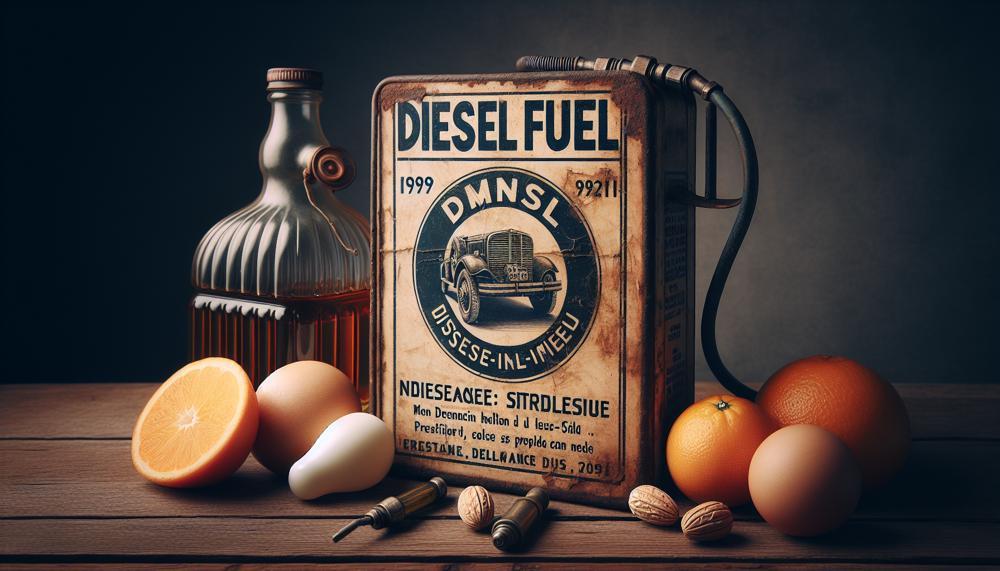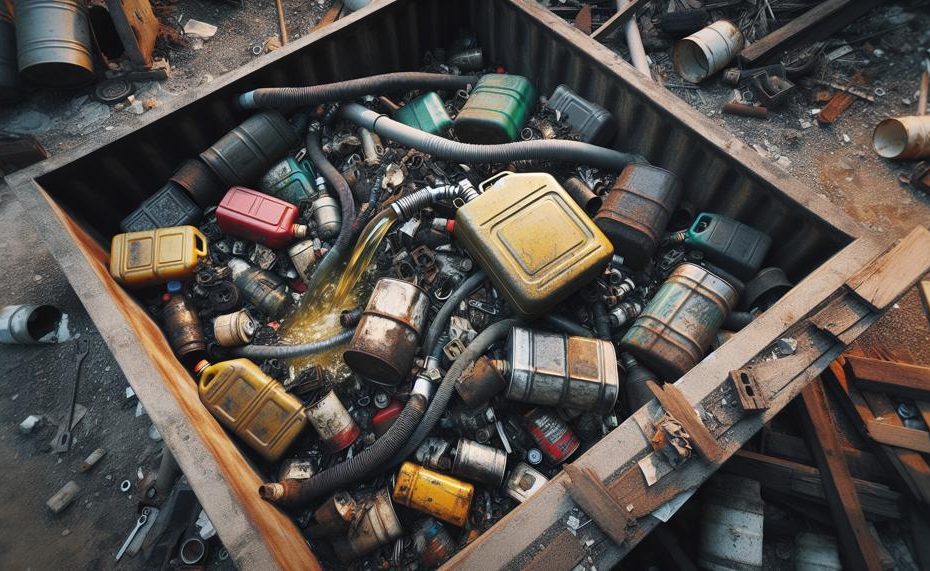Do you have a container of old diesel fuel gathering dust in your garage? Are you unsure of the proper way to dispose of it?
In this blog post, we will explore the importance of disposing of old diesel fuel correctly. We’ll also provide a step-by-step guide on how to do so.
We’ll also cover potential dangers of improper disposal. We’ll offer environmentally-friendly options for getting rid of it.
So, let’s roll up our sleeves and tackle this task together.
- The significance of disposing old diesel fuel properly
- Potential hazards associated with incorrect disposal
- A detailed breakdown of the correct disposal process
- Eco-friendly alternatives for disposing old diesel fuel
- Tips to prevent future accumulation
Contents
When It Comes to Diesel Fuel, How Long Does It Last?
When it comes to diesel fuel, the question on everyone’s mind is how long it lasts. The answer is not that simple. It largely depends on various factors such as storage conditions and treatment. Properly stored diesel fuel can last between 6 to 12 months under ideal conditions. However, for long-term storage, it is recommended to treat the fuel with stabilizers and biocides to extend its lifespan.
Open diesel fuel exposed to air and elements has an estimated storage time of only 1 month. This highlights the importance of proper storage methods. They ensure the fuel lasts a long time. Keeping the diesel fuel cool, consistently below 70 degrees F, is crucial for it to last up to 12 months.
If the fuel is stored in an enclosed container inside or a vehicle’s tank, it can last for 6 months without any treatment. However, treating the fuel with additives can increase its storage time to up to 8 months for old diesel fuel and 12 months for new diesel fuel. This is a small investment that can significantly extend the lifespan of the fuel.
It is crucial to properly dispose of diesel fuel, as it is hazardous and flammable. It is illegal to dispose of it in drains, bodies of water, or landfills. Contact hazardous waste facilities or local recycling centers for guidance on safely disposing of diesel fuel. Old diesel fuel can also be reconditioned using additives. This improves its performance and saves money.
Proper disposal of soaked items such as rags and brushes is also necessary to prevent any potential hazards. Overall, it is important to follow proper guidelines when storing and disposing of diesel fuel. Seek professional advice as well. This helps avoid any legal or health implications.
| Fuel Type | Storage Conditions | Estimated Storage Time |
|---|---|---|
| New Diesel Fuel | Stored in an enclosed container inside or a vehicle’s tank | Up to 6 months without any treatment |
| New Diesel Fuel | Treated with biocides and stabilizers | Can last up to 12 months |
| Old Diesel Fuel | Stored in an enclosed container inside or a vehicle’s tank | Around 3-6 months without any treatment |
| Old Diesel Fuel | Treated with biocides and stabilizers | Can last up to 8 months |
| Open Diesel Fuel | N/A – exposed to air and elements | Only lasts for 1 month |
How Can I Safely Dispose of Diesel Old Fuel?
Properly and safely disposing of old diesel fuel is crucial to avoid any potential hazards. Follow these steps to ensure the safe disposal of your old diesel fuel:
- Check if the fuel can still be used: Before disposing of your old diesel fuel, first check if it is still usable. If the fuel is in good condition, you can dilute it with fresh fuel and continue using it.
- Offer it to someone else: If you are unable to use the fuel yourself, consider reaching out to neighbors or local businesses to see if they can make use of it. This not only avoids waste but also helps someone else out.
- Contact hazardous waste collection companies: If you are unable to find anyone interested in taking the old fuel off your hands, you can contact hazardous waste collection companies. These companies specialize in disposing of hazardous materials and have the necessary expertise to handle old diesel fuel safely.
- Deliver it to a Fire Station: Another option for disposing of old diesel fuel is to take it to a local Fire Station. They have trained professionals who can safely handle hazardous materials.
- Dispose of it at a landfill: If all other options fail, you can dispose of the old diesel fuel at a landfill that accepts hazardous materials. Before disposing of it, make sure to transfer the fuel into spill-proof containers.

| Step | Description | Example |
| Check if the fuel can still be used | Inspect for any signs of contamination or degradation | If the fuel has a foul smell or has changed color, it is likely no longer usable |
| Offer it to someone else | Reach out to neighbors or local businesses to see if they can make use of the old fuel | Your neighbor may have a diesel-powered vehicle or equipment that can still use the fuel |
| Contact hazardous waste collection companies | Search for companies that specialize in disposing of hazardous materials | Companies like Clean Harbors or Heritage Environmental Services can handle the disposal for you |
| Deliver it to a Fire Station | Take the old fuel to a local Fire Station and explain your situation to them | They may have specific guidelines for disposal, so make sure to follow their instructions |
How to Get Rid of Diesel Fuel-Saturated Items
When it comes to getting rid of diesel fuel-saturated items, there are various safe and efficient methods available. These include reaching out to your local waste management facilities and using spill kits. You can also dilute the fuel with water, burn it off, or dispose of it at designated collection sites.
These disposal methods guarantee that the diesel fuel is eliminated in a responsible manner that does not harm the environment or pose any health risks to humans.
It is crucial to handle items soaked in diesel fuel with caution. Adhere to proper disposal guidelines to avoid potential legal or health consequences.
- Handling diesel fuel-saturated items can be quite perplexing, especially if you are not familiar with the appropriate disposal methods. However, there is no need to worry as there are several options you can consider. The first method is to contact your local waste management facilities. Inquire about their specific regulations for disposing of hazardous materials. They may have designated drop-off locations or provide specific instructions for safely disposing of diesel fuel-saturated items.
- Another option is to use spill kits designed specifically for diesel fuel spills. These kits usually come with absorbent materials. The materials can soak up the fuel and safely dispose of it. Diluting diesel fuel with water is also an effective method. It reduces its flammability and makes it easier to dispose of. However, be sure to do this in a well-ventilated area and avoid pouring the diluted fuel down the drain.
- For larger quantities of diesel fuel, burning it off may be a suitable option. This involves carefully lighting the fuel on fire in an open area until it has completely burned off. However, this method should only be used as a last resort and with proper safety precautions in place.
- Lastly, many areas have designated collection sites for hazardous materials where you can safely dispose of diesel fuel-saturated items. Be sure to check with your local authorities for the nearest collection site and their specific guidelines for disposal.
Other Method
There are various methods available for safely disposing of old diesel fuel. These include:
- Recycling is a great option if the old diesel fuel is still usable. It can be reused in other vehicles or equipment, reducing waste and contributing to a more sustainable environment.
- Blending old diesel fuel with new fuel is another effective way to dispose of it. By mixing it with fresh fuel, the quality of the old fuel is improved and it can be used in vehicles without causing any harm.
- Burning old diesel fuel in a controlled environment is also a viable method of disposal. This process involves using specialized equipment to burn the fuel at high temperatures and convert it into harmless byproducts.
- Donating old diesel fuel to someone who can use it is not only an environmentally friendly option but also a compassionate one. There may be individuals or organizations in need of fuel for their operations, and your donation could make a significant impact.
- Lastly, if none of the above methods are feasible, proper storage until safe disposal is possible is crucial. This can prevent any potential harm to the environment or individuals.
Old Diesel Fuel Reconditioning
Today, there are various methods for safely disposing of old diesel fuel. They include recycling, blending, burning, donating, or proper storage.
These methods protect the environment. They also demonstrate responsible and compassionate disposal of the fuel.
Let’s delve deeper into each approach.
Recycling
Recycling old diesel fuel is one of the most common and effective methods for reconditioning it. This process involves taking the old fuel to a nearby refinery, where it can be processed and reused.
By recycling old diesel fuel, we not only reduce waste but also promote sustainability by preventing it from ending up in landfills or harming the environment.
Blending
Another successful method for reconditioning old diesel fuel is blending it with fresh fuel. By mixing the old fuel with new fuel, its quality can be improved, making it suitable for use in vehicles or machinery.
This approach not only helps dispose of the old fuel but also decreases the need for new fuel production.
Burning
Industries that rely on diesel fuel for their operations can dispose of old diesel fuel by burning it in a controlled environment. This is a viable option.
By burning the old fuel under controlled conditions, it can be safely disposed of without causing harm to the environment.
Donating
A responsible way to dispose of old diesel fuel is by donating it to organizations or individuals in need.
Non-profit organizations or community groups may accept unused diesel fuel for their vehicles or machinery. This helps them reduce their operational costs and promote sustainability.
Proper Storage
If none of the above options are available, it is crucial to properly store the old diesel fuel until disposal is possible.
This involves using appropriate containers, such as oil waste drums, barrels, or tanks within weight and volume limits. Then, arrange collection by licensed waste carriers.
Conclusion
In conclusion, it is of utmost importance to dispose of old diesel fuel in a responsible manner for the well-being of ourselves and the planet.
This article provides comprehensive instructions. By following them, you can safely dispose of old diesel fuel without causing any harm. It is also worth considering eco-friendly alternatives. You could recycle, blend, or donate the fuel instead of resorting to disposal methods.
In addition, proper maintenance and storage practices are crucial for reducing excessive black smoke emissions from diesel engines. Let us all play our part in promoting sustainability. We should also support responsible fuel disposal methods.





